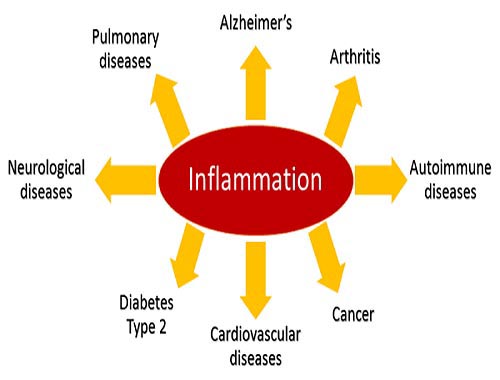Inflammation (any)

Published: 18 Jun 2025
ICD9: ICD10: ICD11:
"Inflammation (any)" is a very broad and nonspecific term.
It refers to the presence of inflammation somewhere in the body, but without specifying the location, cause, or type of inflammation.
Here's a breakdown of what that means:
![]() Inflammation: A complex biological response of the body to harmful stimuli, such as pathogens, damaged cells, or irritants. It's a protective attempt by the body to remove the harmful stimuli and begin the healing process. Inflammation can manifest in various ways, including redness, swelling, heat, pain, and loss of function.
Inflammation: A complex biological response of the body to harmful stimuli, such as pathogens, damaged cells, or irritants. It's a protective attempt by the body to remove the harmful stimuli and begin the healing process. Inflammation can manifest in various ways, including redness, swelling, heat, pain, and loss of function.
![]() (any): This qualifier means that the inflammation could be occurring anywhere in the body, from a tiny inflamed skin pore to a major organ system affected by an autoimmune disease. It could be acute (short-term) or chronic (long-term).
(any): This qualifier means that the inflammation could be occurring anywhere in the body, from a tiny inflamed skin pore to a major organ system affected by an autoimmune disease. It could be acute (short-term) or chronic (long-term).
Why it's important to know this is vague:
If you see "Inflammation (any)" in a medical context (like a symptom list or a preliminary diagnosis), it's a sign that more investigation is needed. It doesn't tell you:
![]() Where the inflammation is located.
Where the inflammation is located.
![]() Why the inflammation is happening (the underlying cause).
Why the inflammation is happening (the underlying cause).
![]() How severe the inflammation is.
How severe the inflammation is.
![]() What kind of inflammation it is (e.g., infectious, autoimmune, allergic).
What kind of inflammation it is (e.g., infectious, autoimmune, allergic).
In summary: "Inflammation (any)" signals that inflammation is present, but provides no details about the nature or location of the problem. It requires further investigation to determine the specific type, cause, and location of the inflammation in order to receive proper treatment.